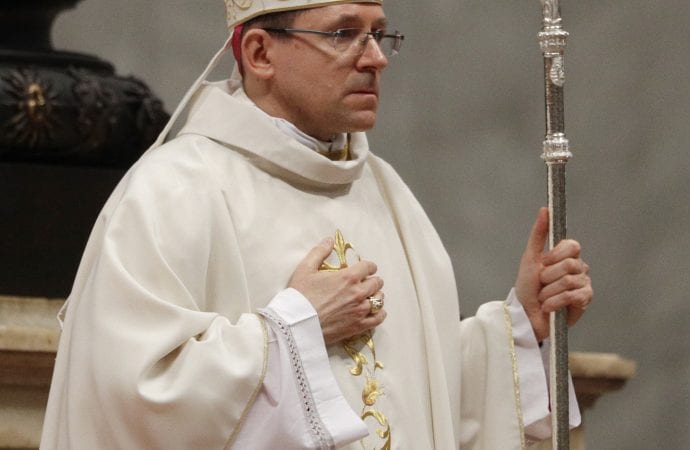Negotiations broke down again on Monday in Nicaragua, after the opposition walked away from the table, in part because of the arrest of several protesters on Saturday.
The Catholic bishops in the country announced earlier this month that they would not be taking part in the talks despite having played a key role in the previous round of talks last year, which took place in the seminary in Managua.
However, the latest round of talks did have one Catholic participant: The papal representative to the country, Polish Archbishop Waldemar Stanislaw Sommertag, was there in the role of “witness” and as someone who’s “accompanying” the dialogue.
Sommertag said on Monday that Nicaragua is a country were there are “a lot of lies,” and that “some forces are mining the field” of the dialogue process aimed at ending the crisis that erupted in the country almost a year ago.
Sommertag was sent to Nicaragua by Francis last year, but he knows the country well, as he’d served in the local Vatican embassy in a different position a few years ago.
“In this country unfortunately, this is something that hurts me, there is no confidence, there are a lot of lies,” the nuncio said at a press conference, in which he requested support for his role in the negotiations.
The Alianza Civica por la Justicia y la Democracia, or Civic Alliance for Justice and Democracy released a statement on Monday saying that its members “strongly condemn the violence and repression exercised” on Saturday, when more than 100 opposition members prepared to rally to demand the release of detainees who were imprisoned for participating in anti-government protests last year.
An estimated 800 people are currently in jail. The government has released about 100 of them, but only on the condition that they remain under house arrest. Those participating in the dialogue have made their release a condition for the talks to continue, along with a demand for elections and having foreign organizations, such as the United Nations, oversee the process.
So far, President Daniel Ortega has refused the demands.
Also on Monday, the government of Ortega and his wife, vice-president Rosario Murillo released a statement in which they described the participation of members of the opposition in the rallies as “contradictory and unusual,” and also “a provocation and disturbance of the public order.”
The video of Sommertag’s press conference is available online and was sent to Crux by several people in Nicaragua. Visibly emotional, he said that “the nuncio has no boss, either from the left or the right, or from behind. He has no bosses and this must be clear for everyone: He’s sacrificing his own life, his space, his work, because I have other jobs to do here, too.”
He also said that some local media are “setting up a trap” to try and halt the talks. “I think a bit of prudence is needed. I don’t defend myself from anything because I don’t need need to do so. Just look at the facts and don’t manipulate the words.”
The Vatican diplomat also denounced the “many lies and little trust” in the Central American country and strongly rejected any rumors of a conflict with Nicaragua’s bishops’ conference over an excessive closeness to the Ortega government.
“I’m not neutral, I cannot be neutral when faced with the suffering of a people,” he said. “However, I am impartial.”
On the local bishops and their decision not to participate in the dialogue, the nuncio only said that it’s a position they’ve taken and that he cannot do anything other than take note of it.
He also pointed out that, at the end of the day, the situation in Nicaragua “is not a question for me,” but a “responsibility of the Nicaraguan people, who need to want a solution. But remember that I will not be the solution. Neither will I ever be an obstacle.”
The negotiations began again in late February, and the opposition has complained that there’s a “lack of political will” to solve the crisis. According to the Inter American Commission for Human Rights (CIDH), the crisis has left at least 325 dead in less than a year. However, when Crux was in Nicaragua in November, many said the true number was more than 500.

